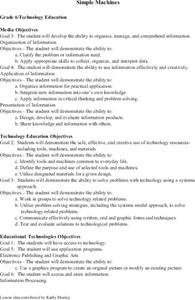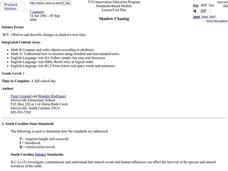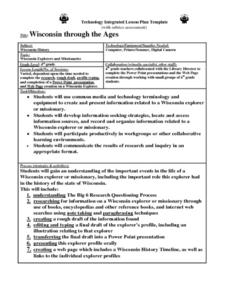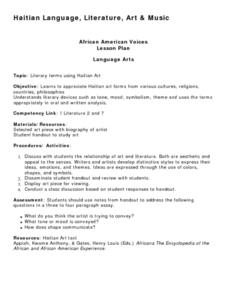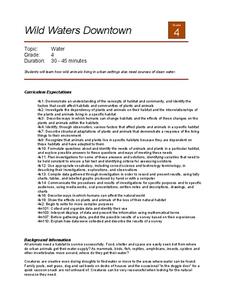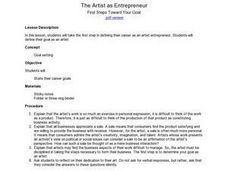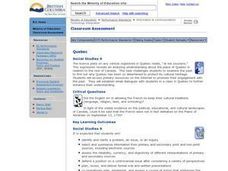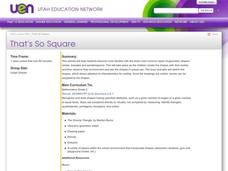Curated OER
Simple Machines
Sixth graders explore simple machines. They identify tools and machines that are used in everyday life. Students examine the purpose and uses of everyday tools. They create a tool or machine that can be used to solve a problem.
Curated OER
Shadow Chasing
First graders observe and measure their shadows. They go outside at three hour increments during the course of a day. Each time students measure and record the length of their shadows. Students read books about shadows and discuss why...
Curated OER
Historical Figures
Student research a "Historical Individual" using the Internet. They print a minimum of five articles and organize them. They create a visual biography of their historical figure.
Curated OER
Wisconsin Through the Ages
Fourth graders research Wisconsin explorers. They analyze sources for information related to a Wisconsin explorer or missionary. They create a rough draft and edit and type a final draft including a profile of their explorer and...
Curated OER
Air: You Can't See It, But It's There!
First graders investigate that air occupies space by performing experiments that show this principle. Students are provided with a lunch bag. Students open the lunch bag and look inside. Students determine if there is anything in their...
Curated OER
Air Quality and Transportation
Second graders study about air pollution and the effects it has on our Earth. Students tally cars on a sheet that has been categorized as follows: One person in car, two persons in car, or three or more persons in car. Students go to...
Curated OER
African American Voices
Young scholars investigate the many forms of Haitian art. They compare the art of some different cultures, religions, countries, and philosophies. Students also read the biography of an artist to build context for a particular piece of...
Curated OER
Take a Survey!
Second graders discuss proper uses of the Internet. They complete the 8-question survey by selecting their favorite answer for each question. They click one time in the white circle to choose an answer and click Next at the bottom on...
Curated OER
Someone Is In The Kitchen
Pupils investigate the lifestyles of the Native Americans and look at a recipe found on a website. They read the recipe and pay attention to the measurements. They differentiate between the various measures in order to apply them to the...
Curated OER
Wild Waters Downtown
Fourth graders investigate how wild animals living in urba settings also need sources of clean water. They discuss the open water issues of West Nile Virus and what happens to urba animals as these poolings area are cleaned up. ...
Curated OER
Wh0-o-o-o's Out There?
Fifth graders describe the physical features of an owl and identify survival adaptations. They Investigate an owl's niche in an ecosystem. The students participate in an interactive puzzle on the internet that helps for motivation.
Curated OER
Jamestown Journey Part 2
Fourth graders create a chart or web to display qualities and characteristics of a good leader.
They write a paragraph describing the qualities of a good Jamestown leader. Finally, 4th graders contribute to small group discussion about...
Curated OER
The Artist as Entrepreneur
Students compare the entrepreneurial process in business and in the art world. They create a scenario of a business opportunity and solution based on a product from a catalog then they research how several successful artists have found...
Curated OER
Healthy Eating
Third graders discuss healthy eating choices. They explore the components of a balanced diet and the importance of a balanced diet to growth and wellness. Students discuss the types of nutrients in fruits and vegetables that are...
Curated OER
How to Invest Your Money
Students use the Internet to research various companies to determine if they are smart investment choices. Using a role-play activity, they pretend they have received an inheritance from a distant relative. They invest the money into...
Curated OER
ADULT ESOL LESSON PLAN--Family and Parenting
Students identify and explain the importance of the purpose of communication between the home and the school environment. In addition, they brainstorm the importance of attending open house and parent/teacher conferences, PTA, etc.
Curated OER
Time Capsule
First graders collect data in the fall and again in the spring. they use the data from both seasons to compare and contrast changes over time. They put the data from the fall into a box or "time capsule." The teacher encourages students...
Curated OER
Fundamentalism
Eighth graders explore the historical roots of fundamentalism and determine whether fundamentalism is a religion or a political ideology. They will examine different religious fundamentalist movements around the world noting any...
Curated OER
Quebec
Ninth graders to examine the past to find out why Quebec has been so determined to protect its cultural heritage. They access primary resources on the Internet to promote their engagement with the past.
Curated OER
The Merci Train
Middle schoolers investigate the Merci Train and conduct research in order to write a summary about its origination and purposes. They make a boxcar that is designed and made from construction paper and glue and wrapped around cardboard.
Curated OER
Food Pyramid
Second graders are introduced to the food groups on the food pyramid. Individually, they draw pictures of their favorite foods and identify which food group it belongs. To end the lesson, they discuss the importance of eating a variety...
Curated OER
That's So Square
Second graders are introduced to circles, triangles and parallelograms. As a class, they create the shape with their bodies and are shown the shapes in their actual size. To end the instructional activity, they sketch each shape and...
Curated OER
Toward Civilization
Pupils are asked to define the term civilization. They work in small groups, each group is given the option of researching either the Neanderthal civilization or that of ancient Egypt. Students apply their definition to two different...
Curated OER
A Tale of Two Towns
Students gain and apply knowledge of life in their own community and compare specific aspects of it to life in other communities. They work in small groups to fill out a questionnaire about life in their community, and email it to e-pals...


